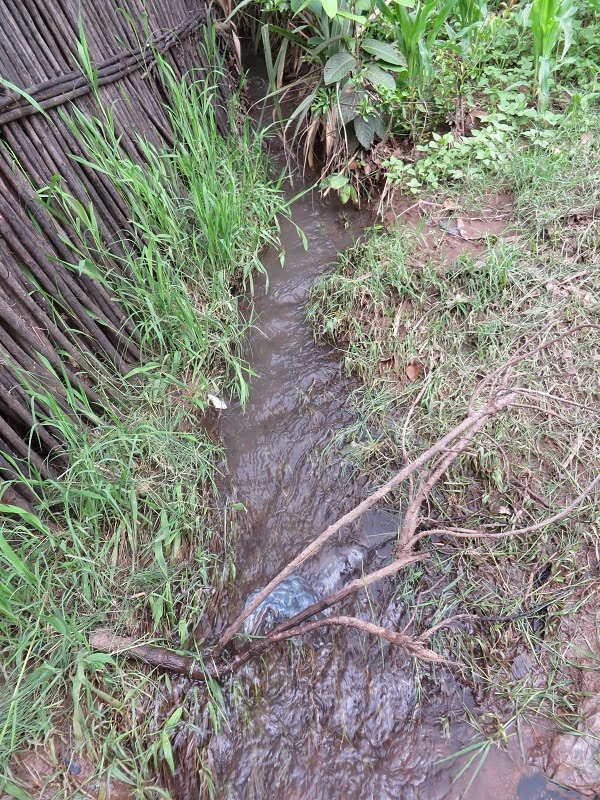Many in Blantyre
draw water directly from small creeks and streams, city water not commonly available
in many townships and private wells (bore holes) too expensive for all but the wealthy. The water so drawn is used for bathing, washing
clothes, and drinking. Apart from the inconvenience,
sourcing water in this way would not be problematic, if the water were clean. Yet, like many third world countries, domestic
water sources are often contaminated. This leads
to enormous health concerns, as many Malawians suffer from water borne illnesses
due to the dirty water. Many the NGOs and Church groups active
in Blantyre are working to address the shortage of clean water by drilling wells and installing pumping equipment.
The first pictures are of the springs high on Mount Soche providing the water many of our members and their neighbors use:
These are not alpine springs flowing directly from underground waterways and chasms.
Not surprisingly, the water gets dirtier as it flows downstream and gets closer to town.
We expect people generally boil the water before drinking it, but do not adhere to the same sanitary precautions when the water is used for washing, laundry and other purposes.
It was against this backdrop that I recently re-read the fourth chapter of John, when Jesus meets the Samarian woman at the well. Thirsty, Jesus asks of the woman a drink of water. She is startled by the request, for the Jews were disdainful of the Samarians and avoided contact with them. Jesus then offers up his idiomatic reply: “If thou knewest the gift of God, and who it is that saith to thee, Give me to drink; thou wouldest have asked of him, and he would have given thee living water.” (John 4: 10) Like each of us, Jesus needed water; it was the source of life. The well in Samarian likely produced water as sandy and dirty as the spring atop Mount Soche. But nonetheless, that water was vital to sustaining life and restoring those parched with thirst. Jesus was not contemptuous of that. The body has its own demands that cannot be ignored. There is however a greater need—the need for the word of God—for that which gives eternal life. “Whosoever drinketh of this water shall thirst again: But whosoever drinketh of the water that I shall give him shall never thirst; but the water that I shall give him shall be in him a well of water springing up into everlasting life.” (John 4: 13-14)
One sees
here an echo of Jesus’s reply to Satan when first tempted after forty days and nights of
fasting. “And when he had fasted forty
days and forty nights, he was afterward a hungred. And when the tempter came to him, he said, If
thou be the Son of God, command that these stones be made bread. But he answered and said, it is written, Man
shall not live by bread alone, but by every word that proceedeth out of the
mouth of God.” (Matt 4: 2-4) In an
impoverished country like Malawi, the needs of the body appear, at times, to
overwhelm everything else. Many of those
we meet are struggling to earn their daily bread; not surprisingly they focus
upon the here and now; upon getting piecework to support their families; upon
finding whatever edge they can to get ahead.
Dishonesty and petty theft are a way of life among almost everyone. They see us, and indeed all westerners, as a
potential source of money and aid. And
while charity is certainly a part of our calling, it is really charity of a
kind different than they expect—indeed, charity different than what they want and what they think they need. It is the full commitment of ourselves--the giving of our "heart, mind, might and strength"--to them and their welfare in such a way as to encourage
or lead them to embrace the word of God. Whatever else we give will have little lasting effect.
In the “bread
of life” passages of John 6, those of the House of Israel Jesus taught spoke of
their fathers: “Our fathers did eat manna in the desert: as it is written, He gave
them bread from heaven to eat.” (John 6:
31) But, while that bread was indeed necessary
for sustaining the body, it was alone not enough. “Your fathers did eat manna in the wilderness,
and are dead. This is the bread which cometh
down from heaven, that a man may eat thereof, and not die. I am the living bread….” (John 6: 50-51) One cannot despise the bread of the body. Without it life is not possible. But in the
end, only the true “word of God”-- the principles of the restored gospel—give eternal
life, supplying the “living water” or the “bread of life.”








No comments:
Post a Comment